900 Killed In Iran's Nowruz Car Accidents, Including 300 Children
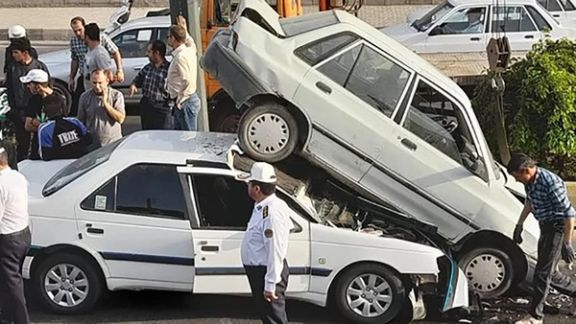
Iranian Traffic Police say more than 85 thousand car accidents occurred during the Nowruz holidays, with 871 people killed, one third of those, children.

Iranian Traffic Police say more than 85 thousand car accidents occurred during the Nowruz holidays, with 871 people killed, one third of those, children.
The statistics, which cover the period since from March 20 to April 2, are dominated by two Iranian made cars, notorious for their poor quality, in addition to the poor infrastructure of Iran’s roads.
Deputy Commander of the traffic police, Teimour Hosseini said the two Iranian car manufacturers’ vehicles, made by Iran Khodro and Saipa, constituted half of the deaths.
While families drive long distances across the country to visit family and take vacations, Hosseini said other factors were also at play, attributing to the high death rate, typical of the holiday season.
He said “over speeding, not paying attention, tiredness and sleepiness" were the main reasons for accidents, but he ignored the issue of non-standard roads and unsafe cars made in Iran.
The regime in Iran tries to convince citizens that the “human factor,” or the drivers, is the main reason for this massive amount of fatalities on the country’s roads.
Iran has one of the worst world’s statistics in terms of road accidents -- at its worst during Nowruz.
Between March 2021 and March 2022, Traffic-related accidents claimed the lives of nearly 17,000 Iranians. Local media says One person dies in a road accident every half hour in Iran.
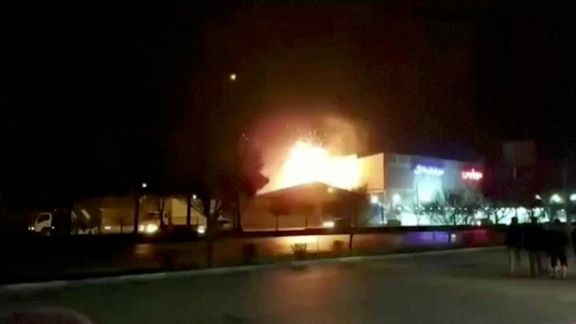
Amid mounting tensions between the Islamic Republic and Israel, there are contradictory reports about the downing of a drone approaching a military site in Esfahan.
Iran's semi-official Tasnim news agency reported Wednesday that the Amir al-Momenin complex was “the target of a failed attack” by a small drone.
The IRGC-affiliated website confirmed the incident and claimed it did not cause any damage. However, there have been no eyewitness accounts or reports among local citizens corroborating the news.
Countering the IRGC, the security deputy of Esfahan governorate, Mohammad-Reza Jan-Nesari, denied any attack on the complex in the area subject of a series of explosions at an Iranian government weapons factory in January. At the time, Iran claimed the explosions were unsuccessful and perpetrated by "mercenaries of the Zionist regime”.
It is also believed that Israel recently carried out the drone attack on the Iranian military center for research and development.
Tehran has repeatedly blamed its arch-foe Israel for such attacks though Israel has neither confirmed nor denied responsibility.
The incident comes days after Israeli air strikes in Syria hit Iran-linked targets that killed at least two Iranian Revolutionary Guards Corps (IRGC) members that served as military advisers in Syria.
This week, Israeli Prime Minister Benjamin Netanyahu told a meeting of intelligence officials that Iran remained the nation’s “supreme mission”.
”In every generation there are those who rise up to destroy us and in this generation Iran has risen up to destroy us,” he said.
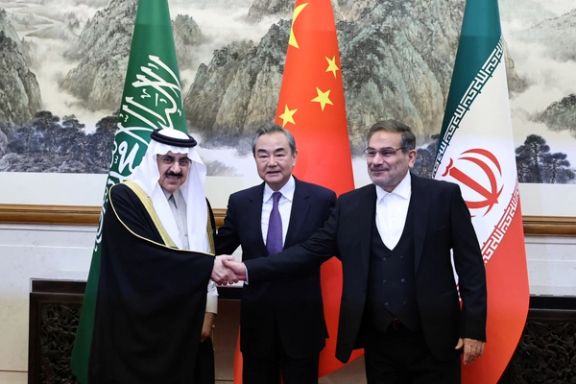
Saudi and Iranian foreign ministers will meet in Beijing Thursday, sources in both countries said, as the two continue rapprochement amid a China-brokered deal.
The meeting between Prince Faisal bin Farhan Al Saud and his Iranian counterpart, Hossein Amir-Abdollahian, will be the first formal meeting between Saudi Arabia and Iran's most senior diplomats in more than seven years.
After years of hostility that had fueled conflicts across the Middle East, Tehran and Riyadh agreed to end their diplomatic rift and re-open embassies in a major deal facilitated by China last month.
"The top envoys agreed to meet on April 6 in Beijing as the deal was facilitated by China," a senior Iranian official told Reuters.
Choosing China "came as an extension of Beijing's positive role in reaching the agreement and facilitating communication between the two countries," Saudi-owned Asharq al-Awsat newspaper cited an unidentified source in Riyadh as saying.
The resumption of relations and arrangements for the exchange of ambassadors will be discussed in the meeting, it added.
Saudi Arabia cut ties with Iran in 2016 after its embassy in Tehran was stormed during a dispute between the two countries over Riyadh's execution of a Shi'ite Muslim cleric.
The relationship had worsened since 2015, after Saudi Arabia and the United Arab Emirates intervened in the Yemen war, where the Iran-aligned Houthi movement ousted a Saudi-backed government and took over the capital Sanaa.
The kingdom has blamed Iran for arming the Houthis who carried out missile and drone attacks on its cities and oil facilities. Iran has denied the charge, although there is plenty of material evidence of Iranian weapons being used by Houthis.
With reporting by Reuters
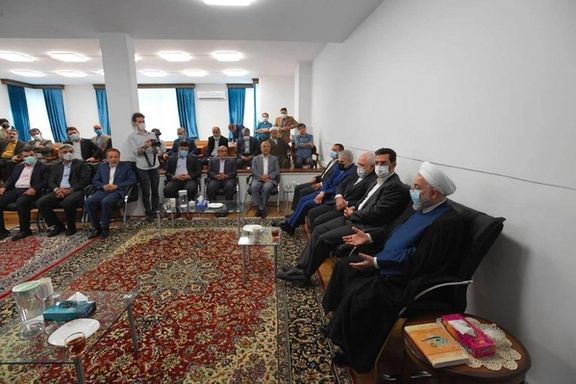
Former Iranian President Hassan Rouhani says the Islamic Republic faces a test in the 2024 parliamentary elections if they are not fair and free.
“The eyes of the world are on the elections so that they see, and we see, whether the elections are held in a healthy, competitive and free manner or not,” the former president said at a meeting with the senior officials of his government, former lawmakers, journalists and politicians on the occasion of the New Year.
While describing the events of the past few months as sad, he reiterated that the answer to people’s demands in the areas of foreign and domestic policies and economy could be found by holding referendums as envisaged by the Constitution of the Islamic Republic.
This was the second time since the beginning of nationwide protests in mid-September that Rouhani suggested fair and free elections and holding referendums as the only way the regime could overcome huge popular discontent within the existing political structure.
Domestic solidarity and the ability to solve problems cannot be attained with “minority government and parliament,” Rouhani said at a meeting with journalists in February referring to widespread protests since mid-September. “The key to solving today’s problems is returning to competitive elections and people’s extensive presence on the scene.”
He also said elections of the first parliament after the Islamic revolution in 1980 could be taken as a model for free elections “to help the country navigate through these difficult circumstances by relying on people’s power.”

The government has set March 1, 2024, as the election date. The regime is likely to have a very difficult time raising any interest in the elections among the hugely disillusioned citizens many among whom said during the recent anti-government protests they wanted not reforms but the end of the Islamic Republic because of its failure to improve the economy, its restriction of social freedoms and its corruption.
After the very lackluster parliamentary elections of 2020 and presidential elections of 2021, in which turnout dropped to unprecedented levels in the history of the Islamic Republic, many said they would never vote again.
The Khamenei-appointed Guardian Council barred even the least controversial reformists and many moderates as well as nearly one-third of the sitting lawmakers from running in February 2020 in the elections of the 11th parliament. Consequently, hardliners won a decisive majority.
The elections were held within a few months from the nationwide anti-government protests of November 2021 during which hundreds were killed by security force.
Not only the opposition, but also most reformist parties and groups boycotted the elections in which only 42.5 percent of the electorate voted. According to rather dubious official data, the minimum turnout for the previous elections was 50.8 percent in 1996 with the highest turnout, 67 percent, in the elections of 2002 in which reformists gained an overwhelming majority in the parliament.
In the presidential elections of 2021, the Guardian Council barred nearly anyone that it considered as challenging to hardliner Ebrahim Raisi including the moderate conservative former Parliament Speaker Ali Larijani.
The government said 48 percent had voted in the 2021 elections but 13 percent of the votes, apparently cast by those who thought not voting could get them into trouble with the authorities, were blank or otherwise not valid.
These elections also followed widespread anti-government protests in July of the same year. At the time, Rouhani said at a cabinet meeting that he had written a letter to Supreme Leader Ali Khamenei to protest the Guardian Council’s extensive disqualification of candidates in the presidential race. “We cannot forsake [the role of] ballot boxes. What are you going to substitute for ballot boxes if you forsake them?”
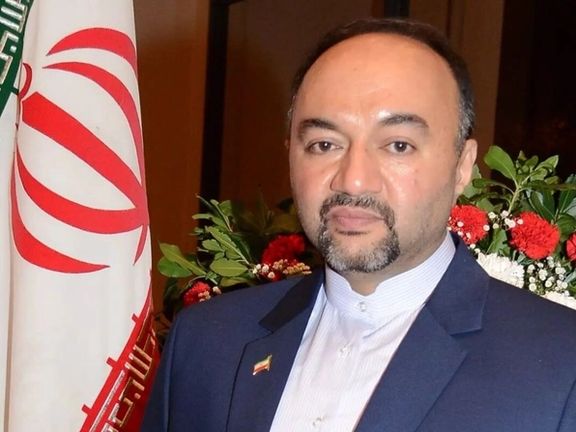
Iran has appointed an ambassador to the United Arab Emirates for the first time in seven years, Iranian state media reported on Tuesday.
Reza Amerihad, the newly appointed ambassador, formerly served as the director general of Iranian expatriates' office in the foreign ministry. His diplomatic posts also include the Islamic Republic’s envoy to Algeria, Sudan and Eritrea.
The announcement came in less thana month after a high-level Iranian delegation -- led by Ali Shamkhani from Iran's Supreme National Security Council (SNSC) -- visited Abu Dhabi, hoping to mend ties with its Persian Gulf neighbor.
In an unexpected move last year, the UAE resumed diplomatic relations and returned its ambassador to Tehran after ties soured following the storming of the Saudi embassy in Tehran in January 2016. Saudi Arabia severed relations with the Islamic Republic after pro-government mobs attacked and ransacked its embassy in Tehran and consulate in Mashhad following the execution of a Saudi Shiite cleric.
Earlier in March, Iran and Saudi Arabia agreed to re-establish diplomatic ties after Chinese-mediated talks in Beijing. Over five days of negotiations, it was agreed that the two countries will reinstate ambassadors after seven years of tensions. Iranian and Saudi foreign ministers are scheduled to meet in Beijing on Thursday.
Crippling sanctions and a revolution which has plunged Iran into its worst recession in decades, has forced the hardline Iranian leaders to mend ties with neighboring countries in the hope for the revival of the 2015 nuclear deal known as the JCPOA.
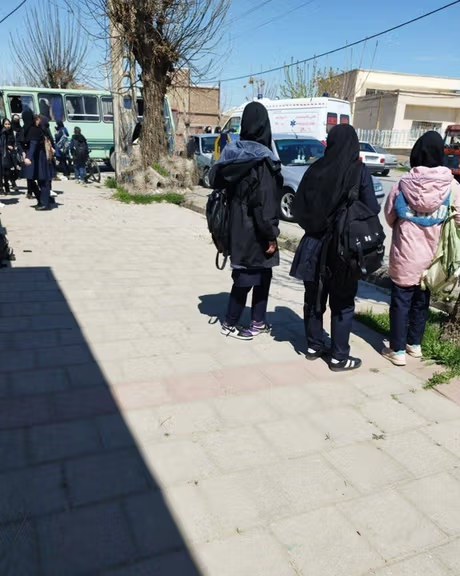
With the end of New Year holidays and the re-opening of educational centers in Iran, chemical attacks on schools have resumed.
On Monday and Tuesday, it was reported that at least five schools were targeted across the country with schoolgirls being poisoned apparently by chemicals spread throughout buildings.
Media and human rights organizations reported attacks on schools in the cities of Urmia and Naqadeh in West Azarbaijan Province, Tabriz and Esfahan.
ISNA state news agency quoted Head of Emergency Department of East Azarbaijan Province Asghar Jafari Rouhi as saying on Tuesday that 20 female students from Tabriz were taken to hospital with respiratory symptoms and shortness of breath.
According to information received by Iran International, there was a chemical attack on an elementary school in Urmia, but no more information is available on the number of poisoned children.
Kurdish rights group Hengaw reported that In Naqadeh, at least four schools were targeted by chemical attacks and tens of students were poisoned.
On the other hand, Rokna news agency, which covers the news of such incidents, reported another chemical attack on a girls' school in the central city of Esfahan.
The report of the poisoning of dozens of schoolgirls immediately after school re-openings, comes as at least 130 elementary and high schools were targeted in the past Iranian year.
The attacks that started in November have continued without any apparent effort by the government to seriously pursue the perpetrators or explain to terrified parents and students what was happening in so many schools.
Many ordinary Iranians have been suspicious of involvement of the regime itself, or religious extremists protected by the regime, calling the attacks “state terrorism”.